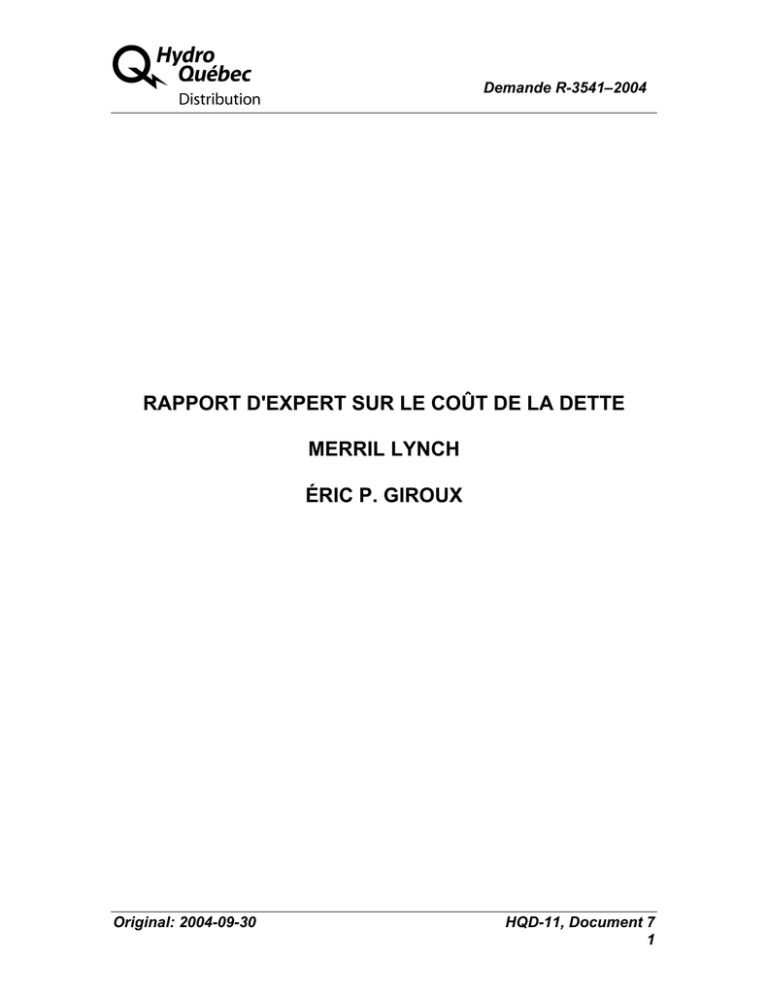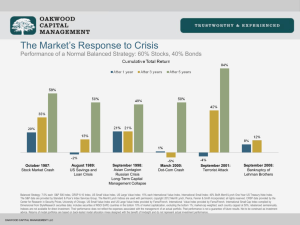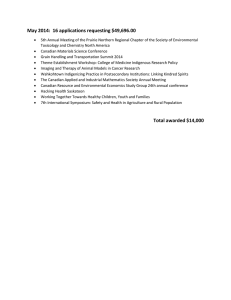A RAPPORT D'EXPERT SUR LE COÛT DE LA DETTE MERRIL LYNCH
advertisement

A Demande R-3541–2004 RAPPORT D'EXPERT SUR LE COÛT DE LA DETTE MERRIL LYNCH ÉRIC P. GIROUX Original: 2004-09-30 HQD-11, Document 7 1 TransEnergie’s Borrowing Cost Without the Québec Guarantee1 Background In 2001, Merrill Lynch compared Hydro-Québec’s borrowing costs with the Quebec guarantee versus what the theoretical cost of borrowing would be without the Quebec guarantee. For the purposes of our updated analysis, we did not have the benefit of comparing a Canadian long term index with TransEnergie long term cost of funds. As a result of S&P’s acquisition of CBRS, the CBRS indices used in our past analysis are no longer updated. Therefore, for the purposes of analyzing domestic spreads, we used 2 Merrill Lynch’s indices with an average duration of approximately 5 years and compared them against TransEnergie 5 year cost of funds in Canada. For reference, below is an excerpt from our 2001 report: Hydro Québec’s Borrowing Cost Without the Guarantee In order to opine on Hydro-Québec’s theoretical borrowing cost without the government guarantee, Merrill Lynch has analyzed Hydro-Québec bond trading levels in the secondary market for a period of 10 years, i.e. from January 1990 to January 2000 and compared these trading levels to levels shown in Moody’s Bond Indices “Average Yield of Utility Bonds rated Baa” and CBRS’s “Canadian Bond Yield Averages for B++ Utilities”. We have limited our analysis over a 10 year period because Hydro-Québec's guarantor, the Province of Québec, was better rated in the early 1990's. Therefore, the spread differential between Hydro-Québec bonds (with the guarantee) and BBB utilities would be greater. Ten years is a sufficient period of time to encompass different economic cycles and market conditions. Merrill Lynch has found that from January 1990 to January 2000, Hydro-Québec’s longterm borrowing cost in the Canadian or US markets with the guarantee from the Province of Québec (expressed as a spread over the corresponding government benchmark yield) was, on average for this period, of at least 50 bps less than what a Baa (Moody’s)/B++ (CBRS) rated utility would have paid. 1 Although, we are using TransEnergie as the center of our analysis, the same analysis and the same conclusions stand if we are using HQ Distribution as the contemplated issuer. 3 H y d r o -Q u e b e c L o n g T e r m F ix e d F in a n c in g L e v e ls (S in c e Jan u ar y 1 9 9 0 ) 1 4 .0 % 1 3 .0 % 1 3 .0 % 1 2 .0 % 1 2 .0 % 1 1 .0 % 1 1 .0 % 1 0 .0 % 1 0 .0 % 9 .0 % 9 .0 % 8 .0 % 8 .0 % 7 .0 % 7 .0 % 6 .0 % 6 .0 % 5 .0 % 5 .0 % 4 .0 % 4 .0 % 3 .0 % 3 .0 % 2 .0 % 2 .0 % 1 .0 % 1 .0 % 0 .0 % J a n- 9 0 Re-Offer Level (YTM%) Re-Offer Level (YTM%) 1 4 .0 % 0 .0 % Ja n-9 1 Ja n-9 2 Ja n-9 3 C B RS Ja n-9 4 M o o d y 's J a n- 9 5 J a n- 9 6 H Q - C a na d a Ja n-9 7 Ja n-9 8 Ja n-9 9 J a n- 0 0 HQ - US 4 Hydro-Quebec Long Term Fixed Financing Levels (Since January 1990) 160 15.0% 150 14.0% 140 13.0% 130 12.0% 120 11.0% 110 10.0% 100 9.0% 90 8.0% 80 7.0% 70 6.0% 60 5.0% 50 4.0% 40 3.0% 30 2.0% 20 1.0% 10 0.0% Jan-90 Spread to Treasury (bps) Level (Gross Re-offer Spread) 16.0% 0 Jan-91 Jan-92 Jan-93 YTM - US Jan-94 Jan-95 YTM - Canada Jan-96 Jan-97 Spread - US Jan-98 Jan-99 Jan-00 Spread - Canada Hydro-Quebec Long Term Fixed Financing Levels (Since January 1990) 160 140 120 100 80 60 40 20 0 Jan-90 N ov-90 Sep-91 Jul-92 M ay-93 M ar-94 Jan-95 N ov-95 Sep-96 Jul-97 Canadian Spread Differential US Spread Differential Average Canadian Spread Differential Average US Spread Differential M ay-98 M ar-99 Jan-00 Although we have made a comparison of Hydro-Québec’s long term borrowing cost in the Canadian market with what a B++ rated utility would have paid, it doesn’t mean that a B++ issuer would have had the same access in terms of volume and frequency of issuance to Canadian capital markets that HQ enjoyed over the year. In fact, we express doubts that Hydro-Québec would have had the same access to Canadian capital markets with a B++ rating. We stand by our 2001 opinion and reiterate our view. When we compared Hydro-Québec’s long term fixed financing levels versus CBRS’s “Canadian Bond Yield Averages for B++ Utilities” from January 1990 to January 2000 we concluded that TransEnergie’s long term borrowing cost with the Quebec guarantee was, on average for this period, at least 50 basis points less than what a B++ rated utility would have paid. 5 Analysis Merrill Lynch has analyzed Hydro-Québec bond trading levels in the secondary market as a proxy for TransEnergie bond trading levels with Quebec guarantee. Our assumption that without the Québec guarantee, TransEnergie bonds would carry a BBB equivalent rating (as per the credit analysis performed by Mrs. Emily Eisenlhor). We compared 5 year Hydro-Québec spreads in Canada against the Merrill Lynch Canadian Corporates BBB Index (modified duration of 4.3 years) and the Merrill Lynch Canadian Utilities Index (modified duration of 6.3 years). We also compared 30 year Hydro-Québec spreads in the U.S. against the Moody’s Utility Baa Index (minimum maturity of 20 years with an average maturity of 30 years). Graphs of the two comparisons are depicted below. Merrill Lynch found that from January 1993 to January 2004, Hydro-Québec’s long-term borrowing cost in the U.S. markets with the guarantee from Québec (expressed as a spread over the corresponding government benchmark yield) was, on average for this period, 79 basis points less than what a Baa rated utility would have paid. Similarly, we also found that from December 1996 to December 2003, HydroQuébec’s 5-year borrowing cost in the Canadian markets with the guarantee from Québec (expressed as a spread over the corresponding government benchmark yield) was, on average for this period, 80 basis points less than what a BBB rated utility would have paid. Although we have made a comparison of Hydro-Québec’s borrowing costs in the Canadian and U.S. markets with what a BBB rated utility would have paid, it does not necessarily mean that a BBB rated issuer would have had the same access to capital markets that Hydro-Québec experienced over the observed time periods (in terms of volume and frequency of issuance). To reinforce this view we analyzed BBB rated issuance in the utility sector in the Canadian market from January 2001 to today. We found that there have been 16 issues totaling C$3.655 billion over that time period and that the average issue size has been C$228 million. Given TransEnergie’s borrowing requirements, it is unlikely that TransEnergie would be able to satisfy its funding objectives in the Canadian market (in terms of issuance volume) without the Quebec guarantee. 6 US Yields - 30 Year Maturity 10.00 9.00 % 8.00 7.00 6.00 5.00 QHEL USD 30yr Yield Jan-04 Jan-03 Jan-02 Jan-01 Jan-00 Jan-99 Jan-98 Jan-97 Jan-96 Jan-95 Jan-94 Jan-93 4.00 Moody's Baa Utility Index Canadian Yields - 5 Year Maturity 9.00 8.00 % 7.00 6.00 5.00 4.00 QHEL CAD 5yr Yield Merrill Canadian Corporates BBB Index Dec-03 Jun-03 Dec-02 Jun-02 Dec-01 Jun-01 Dec-00 Jun-00 Dec-99 Jun-99 Dec-98 Jun-98 Dec-97 Jun-97 Dec-96 3.00 Merrill Canadian Utilities Index Data Sources Used Moody’s Utility Baa Index minimum maturity of 20 years with an average maturity of 30 years published by Moody’s Investor Services Merrill Lynch Canadian Corporates BBB Index - modified duration of 4.3 years Merrill Lynch Canadian Utilities Index - modified duration of 6.3 years) Published by Merrill Lynch Index Group 7 Biography Merrill Lynch Canada Inc. BCE Place 181 Bay Street Suite 400 Toronto, ON M5J 2V8 eric_giroux@ml.com (416) 369-7626 ERIC P. GIROUX Mr. Giroux has over 10 years of experience in the investment banking industry. He began his career in 1992 as a Vice President for Yamaichi International Canada Ltd in Montreal, Quebec. In 1994, he joined Scotia Capital Markets in London, England as a Director in Capital Markets. In 1997, he joined Toronto Dominion Bank in London, England as a Director and Head of European Private Placements and Structured Products. In 1999, Mr. Giroux joined Merrill Lynch Canada in Montreal, Quebec as a Director in Debt Capital Markets. In 2001, Mr. Giroux was promoted to Director and Co-Head of Debt Capital Markets in Toronto, Ontario where he acts as Head of Canadian public sector Capital Markets and Financing. He has executed several global bond financings and derivative transactions for key government and corporate issuers. Mr. Giroux holds a B.A.A. degree and is a member of the Canadian Institute of Chartered Accountants. # # # 8


